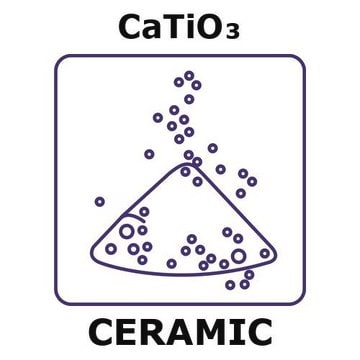396141
Strontium titanate
powder, 99%
Synonym(s):
Strontium titanium trioxide
Sign Into View Organizational & Contract Pricing
All Photos(3)
About This Item
Linear Formula:
SrTiO3
CAS Number:
Molecular Weight:
183.49
EC Number:
MDL number:
UNSPSC Code:
12352300
PubChem Substance ID:
NACRES:
NA.23
Recommended Products
Quality Level
Assay
99%
form
powder
reaction suitability
reagent type: catalyst
core: titanium
mp
2060 °C (lit.)
density
4.81 g/mL at 25 °C (lit.)
SMILES string
[Sr++].[O-][Ti]([O-])=O
InChI
1S/3O.Sr.Ti/q;2*-1;+2;
InChI key
VEALVRVVWBQVSL-UHFFFAOYSA-N
Looking for similar products? Visit Product Comparison Guide
Storage Class Code
11 - Combustible Solids
WGK
WGK 3
Flash Point(F)
Not applicable
Flash Point(C)
Not applicable
Personal Protective Equipment
dust mask type N95 (US), Eyeshields, Gloves
Choose from one of the most recent versions:
Already Own This Product?
Find documentation for the products that you have recently purchased in the Document Library.
Customers Also Viewed
L Avilés Félix et al.
Nanotechnology, 23(49), 495715-495715 (2012-11-17)
The transport properties of ultra-thin SrTiO(3) (STO) layers grown over YBa(2)Cu(3)O(7) electrodes were studied by conductive atomic force microscopy at the nano-scale. A very good control of the barrier thickness was achieved during the deposition process. A phenomenological approach was
Troy K Townsend et al.
ACS nano, 6(8), 7420-7426 (2012-07-24)
SrTiO(3) (STO) is a large band gap (3.2 eV) semiconductor that catalyzes the overall water splitting reaction under UV light irradiation in the presence of a NiO cocatalyst. As we show here, the reactivity persists in nanoscale particles of the
Chemically driven nanoscopic magnetic phase separation at the SrTiO(3) (001)/La(1-x) Sr(x) CoO(3) interface.
Maria A Torija et al.
Advanced materials (Deerfield Beach, Fla.), 23(24), 2711-2715 (2011-04-21)
Ralf Moos et al.
Sensors (Basel, Switzerland), 11(4), 3439-3465 (2011-12-14)
Resistive oxygen sensors are an inexpensive alternative to the classical potentiometric zirconia oxygen sensor, especially for use in harsh environments and at temperatures of several hundred °C or even higher. This device-oriented paper gives a historical overview on the development
Archana Pandey et al.
ACS nano, 7(1), 117-125 (2012-12-04)
Novel PMMA-STO-CNT matrices were created by opened-tip vertically aligned multiwalled carbon nanotubes (VA-MWCNTs) with conformal coatings of strontium titanate (STO) and poly(methyl methacrylate) (PMMA). Emission threshold of 0.8 V/μm was demonstrated, about 5-fold lower than that of the as-grown VA-MWCNTs.
Our team of scientists has experience in all areas of research including Life Science, Material Science, Chemical Synthesis, Chromatography, Analytical and many others.
Contact Technical Service







